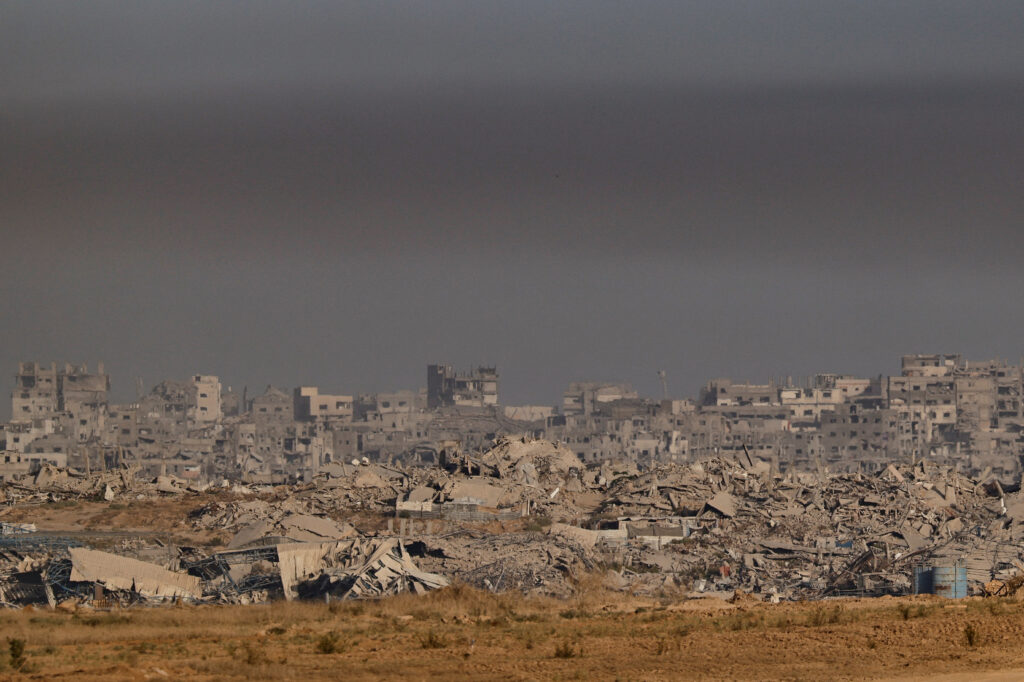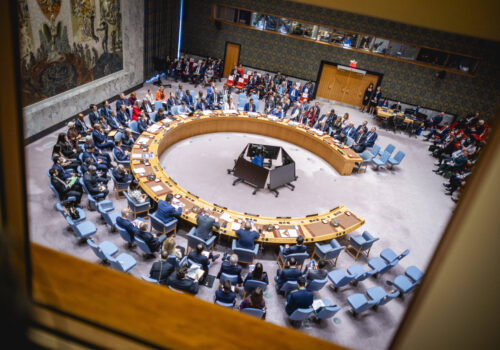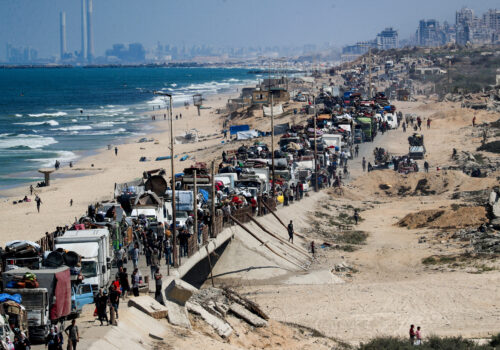JUST IN
The answer is yes, but. . . On Friday, Hamas agreed to release all of the remaining hostages that it captured during its October 7, 2023, terrorist attack on Israel, and the Israeli government said it was preparing for the hostages’ “prompt release.” But at the same time, Hamas called for further negotiations over a US- and Israeli-backed proposal for ending the Israel-Hamas war. US President Donald Trump responded by saying that “Israel must immediately stop the bombing of Gaza” to allow for the hostages’ release. What does Hamas’s statement signal about a potential cease-fire? And how will Israel respond? Our Middle East experts share their insights below.
TODAY’S EXPERT REACTION BROUGHT TO YOU BY
- Jennifer Gavito: Nonresident senior fellow with the Atlantic Council’s Scowcroft Middle East Security Initiative and former US acting principal deputy assistant secretary of state for Near Eastern affairs
- Jonathan Panikoff (@jpanikoff): Director of the Council’s Scowcroft Middle East Security Initiative and former US deputy national intelligence officer for the Near East
- Ahmed F. Alkhatib (@afalkhatib): Director of the Atlantic Council’s Realign For Palestine project and native of Gaza City
What has Hamas agreed to?
- Hamas’s statement is “no question a positive development,” says Jen, “albeit one that is likely to expose all sides’ intentions and constraints going forward.”
- Jonathan called the Hamas announcement, “a play out of Iran’s playbook.” That’s because instead of a simple yes or no, Hamas is trying “to buy time through a muddled response that seeks to redirect the pressure” to the government of Israeli Prime Minister Benjamin Netanyahu.
- Ahmed expected a “yes, but” response from Hamas. But he said it is “surprising” that the Hamas “has defied the US president’s take-it-or-leave-it offer” in “foundational areas.” Hamas, Ahmed notes, essentially divided the deal in two: first, a “cease-fire and hostage deal,” then “security and political arrangements.”
- “Trump’s statement welcoming Hamas’s agreement reaffirms a positive vision for the end of the conflict, but likely unrealistically so,” Jen tells us, laying responsibility at the feet of Israel and Hamas to carry that vision forward.
- Ahmed, however, was surprised by Trump’s positive response, saying that the US president’s social media post reflects either “a desperate desire to end this war at all costs or a grave misunderstanding” of what Hamas has agreed to.
Sign up to receive rapid insight in your inbox from Atlantic Council experts on global events as they unfold.
What is Netanyahu thinking?
- Netanyahu will “almost certainly” be “disappointed” with Trump’s post, Jonathan tells us, since it could signal US support for reopening negotiations on the peace proposal. But he adds that the proposal’s “insistence that Hamas be disarmed,” among other conditions, “were never going to be accepted by the group.”
- For Hamas’s announcement to develop into a cease-fire, it will require “immediate and politically painful reciprocation” from the Netanyahu government, Jen says.
- But, as Jonathan tells us, Netanyahu’s “domestic politics have not been this flexible since the beginning of the war.” That’s because even if “ultranationalist” members of Netanyahu’s coalition were to withdraw in opposition to the agreement, members of the opposition “would almost certainly fill the void to secure a hostage deal that ends the war,” he says. And if a coalition collapse triggers an early election, Israel must hold legislative elections by October 2026 anyway.
What’s next?
- Whether these developments will lead to an end of the war in Gaza in the coming days “will ultimately turn on the question of Hamas’s disarmament, as well as on the sequencing of Israeli hostages being released and Israel Defense Forces’ withdrawal from Gaza,” says Jonathan.
- Another aspect of peace negotiations that “will be fraught,” says Jen, is the nature of a proposed postwar international security force and who would participate.
- “Some Arab countries have already made clear their participation is contingent on a clear Israeli commitment to Palestinian sovereignty and a return of the Palestinian Authority to Gaza,” Jen notes, conditions that right-wing members of Netanyahu’s coalition are likely to block.
- Ahmed finds it “concerning” that “Hamas wants to have influence and a role in how the Strip is governed” in a postwar settlement. This demand, he says, “presents a very serious risk of Hamas realizing one of its long-sought goals, which is to reign but not directly rule” over Gaza, which he says is a “cheaper and more palatable option” to Hamas.
- Even given the uncertainty around the future of peace negotiations, says Ahmed, “there is hope that any end to the fighting will still bring a desperately needed reprieve for a population that has suffered so horrendously over the past two years.”
Further reading
Thu, Oct 2, 2025
Why Israel’s push for West Bank annexation is going mainstream—and what it means for the Abraham Accords
MENASource By Itai Melchior
In the past, West Bank annexation was only endorsed by smaller right-wing parties. But today—the demands are far more mainstream in Israel.
Tue, Sep 30, 2025
How a UN Security Council resolution could help end the war in Gaza
New Atlanticist By Thomas S. Warrick
Drawing inspiration from an earlier example, the council should pass a one-time-only resolution authorizing an international transitional governing authority and security force.
Tue, Sep 23, 2025
Dispatch from 2,200 feet over Gaza: What I learned from airdropping desperately needed food aid
New Atlanticist By Ahmed F. Alkhatib
The head of Realign For Palestine, an Atlantic Council project, joined a recent humanitarian flight over the Gaza Strip that delivered much-needed food to Palestinians.
Image: Destroyed buildings in Gaza, as seen from Israeli side of the Israel-Gaza border, in Israel, October 3, 2025. REUTERS/Amir Cohen



